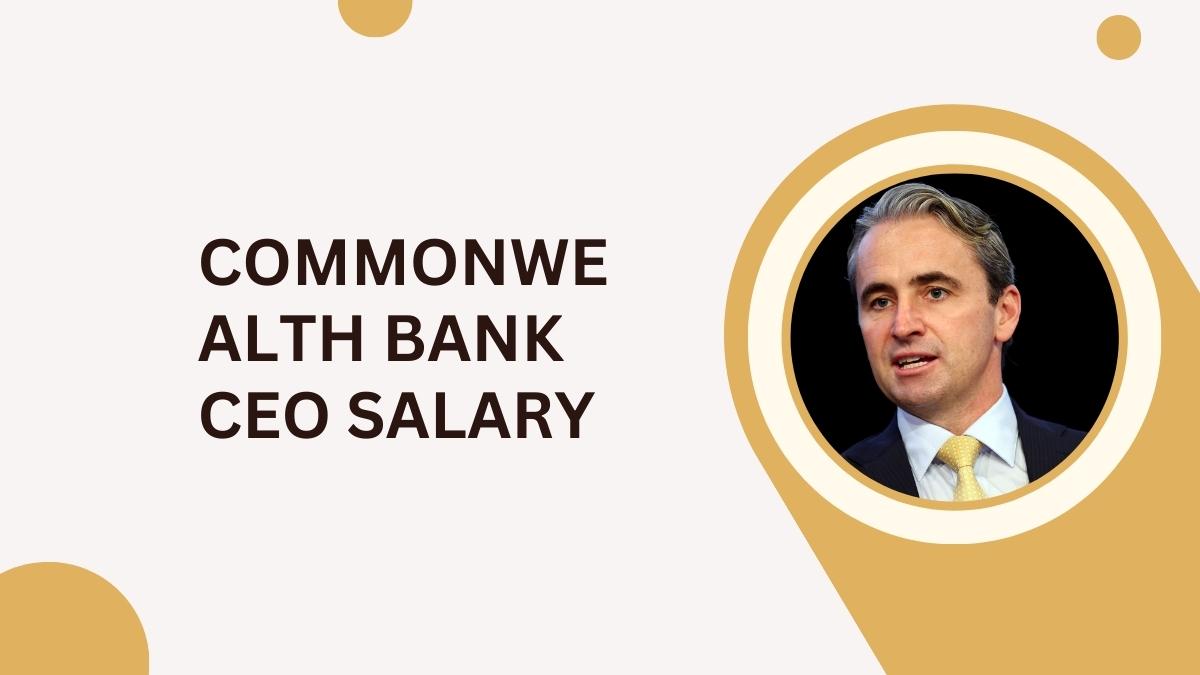Commonwealth Bank CEO Salary: Unveiling Executive Compensation
Are you curious about the jaw-dropping figures that swirl around executive compensation in the corporate world? Well, get ready to dive into the whirlwind of numbers as we unveil one of Australia’s most controversial pay packages – Commonwealth Bank CEO Salary!
Brace yourself for an eye-opening exploration that delves deep into the realms of wealth, power, and everything in between. Join us on this rollercoaster ride through a sea of digits as we unravel the mysteries behind executive earnings and challenge your perceptions along the way. Buckle up because it’s time to expose what lies beneath those astronomical paychecks!
What is Executive Compensation?
Executive compensation refers to the monetary and non-monetary benefits, incentives, and bonuses received by top-level executives in a company. These executives hold positions such as CEO, CFO, COO, and other C-suite roles that are responsible for making crucial decisions and leading the company towards its goals.
The concept of executive compensation has been widely debated in recent years due to its significant impact on a company’s financial performance and public perception. In particular, the salary of CEOs has come under scrutiny as it often reaches millions of dollars annually.
The main purpose of executive compensation is to attract and retain top talent in leadership roles within an organization. As these individuals play a critical role in driving the success of a company, they are compensated accordingly with high salaries and various perks.
Apart from base salary, which is usually set at a competitive market rate based on factors such as industry standards and company size, several other components make up executive compensation. These may include bonuses, stock options or grants, pension plans or retirement benefits, health benefits, and other forms of deferred payment.
Performance-based bonuses are one of the most common types of incentive offered to top-level executives. This type of bonus is tied directly to the company’s performance metrics, such as revenue growth or profitability targets. By aligning executive pay with company performance, it encourages executives to make decisions that benefit both themselves and the organization.
The History of Commonwealth Bank CEO Salaries
The Commonwealth Bank of Australia (CBA) is one of the leading banks in Australia and has a significant impact on the country’s economy. As such, the salaries of its top executives, particularly the Chief Executive Officer (CEO), have always been a topic of interest and scrutiny.
The history of Commonwealth Bank CEO salaries dates back to 1912, when the bank was established as a government-owned institution. The first CEO, Denison Miller, was appointed with an annual salary of £3,500. At that time, this was considered a handsome sum for a public servant. However, with inflation and changing economic conditions over the years, the CEO salary at CBA has significantly increased.
In 1991, during the banking deregulation period in Australia, CBA was privatized and became listed on the Australian Stock Exchange (ASX). This move resulted in an increase in executive compensation across all levels as banks aimed to attract top talent from other industries.
In 1992, David Murray was appointed as CBA’s CEO with an annual salary package worth $750,000. This amount included base salary plus bonuses and benefits such as share options and retirement plans. Murray held this position until 2005, when he retired with a total payout of $37 million.
Murray’s successor, Ian Narev, took over as CEO in 2011 and earned $16 million in his first year alone. His remuneration also consisted of various performance-based incentives such as short-term cash bonuses and long.
Comparison with Other Banks and Industries
When it comes to executive compensation, the banking industry has long been under scrutiny for its high salaries and bonuses. The Commonwealth Bank CEO’s salary is no exception, with its current CEO, Matt Comyn, receiving a total remuneration of $5.7 million in 2020. While this may seem like a substantial amount, how does it compare to other banks and industries?
In comparison to other major Australian banks, Comyn’s salary is relatively lower. For example, the CEO of ANZ bank received a total pay package of $8.3 million in 2020, while the Westpac CEO earned $2.9 million. This shows that Comyn’s salary falls somewhere in the middle when compared to his counterparts at other big banks.
However, when looking at international banks and financial institutions, Comyn’s compensation may seem significantly higher. For example, the CEO of US-based JPMorgan Chase & Co earned a whopping $31 million in 2020, almost six times more than Comyn’s salary.
It is also essential to consider the size and complexity of each organization when comparing executive salaries. The Commonwealth Bank is Australia’s largest bank by market capitalization and has over 16 million customers worldwide. In contrast, ANZ bank has approximately half that number of customers and operates primarily in Australia and New Zealand.
Public Perception and Criticisms of the CEO Salary
The salary of a CEO is often a highly controversial topic, especially when it comes to large corporations like Commonwealth Bank. While some argue that high executive salaries are justified due to the level of responsibility and impact, they have on the company’s success, others believe that such outrageous compensation packages create income inequality and contribute to corporate greed.
One common criticism of CEO salaries is that they are disproportionately higher than the average worker’s pay within the same company. In 2020, Commonwealth Bank’s CEO, Matt Comyn, earned a total remuneration package of $3.2 million, which was almost 50 times more than the median full-time adult weekly earnings in Australia at $1,714 per week. This huge discrepancy raises questions about fairness and equity within the company.
Moreover, many argue that these high salaries do not align with actual performance or value added by CEOs. Studies have shown that there is no significant correlation between executive pay and overall company performance. This has led to accusations of excessive greed on behalf of CEOs who continue to demand higher salaries despite lacklustre results for their companies.
Another concern raised by critics is the use of bonuses and other incentives in executive compensation packages. These bonuses are often tied to short-term financial targets rather than long-term sustainable growth strategies for the company. This can lead to CEOs prioritizing short-term gains over long-term success, potentially harming both employees and shareholders in the long run.
Impact on Shareholders, Employees, and Customers
The impact of executive compensation, particularly the CEO salary, is not limited to the individual receiving it. It has a ripple effect that can be felt by various stakeholders in a company, including shareholders, employees, and customers. In this section, we will delve into how the Commonwealth Bank CEO’s salary impacts these three groups.
- Shareholders:
Shareholders are the owners of a company, and their primary goal is to maximize their return on investment. The CEO’s salary is usually one of the factors they consider when evaluating the company’s financial performance. A high CEO salary can raise questions about whether it is justified and if it aligns with shareholder interests.
Moreover, a significant portion of executive compensation often comes in the form of stock options or bonuses linked to share price increases. This creates an incentive for CEOs to prioritize short-term gains over long-term sustainable growth, which may not always be in the best interest of shareholders.
Additionally, if a company faces financial difficulties or poor performance under a highly paid CEO, shareholders may question whether their money is being well-managed and demand changes in leadership. - Employees:
Employees are directly impacted by executive compensation as it sets a precedent for all other salaries within the organization. When top executives receive exorbitant salaries while regular employees struggle with low wages and job insecurity, it can create feelings of resentment and demotivation among employees.
Furthermore, high CEO salaries may also lead to budget cuts in other areas, such as employee benefits or training programs.
Potential Changes and Reforms for Executive Compensation
As one of the largest and most prominent banks in Australia, Commonwealth Bank has always been under public scrutiny when it comes to executive compensation. In recent years, there have been calls for changes and reforms in the way the bank’s executives are compensated, particularly regarding their salary and bonuses.
One of the main issues that have sparked this discussion is the significant gap between CEO pay and average employee pay at Commonwealth Bank. According to reports, CEO Matt Comyn earned 108 times more than the median salary of a full-time bank employee in 2020. This large disparity has raised questions about fairness and equity within the company.
To address these concerns, there have been several proposals for potential changes and reforms in executive compensation at Commonwealth Bank. One option is to implement a cap on administrative salaries, either through legislation or voluntary measures by the company itself. This would ensure that top executives are not earning excessively high wages above a certain limit.
Another suggestion is to tie executive compensation more closely to performance metrics beyond just financial targets. This could include factors such as customer satisfaction, employee engagement, diversity initiatives, and corporate social responsibility efforts. Incorporating these elements into executive compensation packages would incentivize leaders to prioritize not just profits but also ethical business practices.
There have also been discussions about introducing clawback provisions for bonuses paid to executives if they engage in misconduct or their actions lead to negative consequences for the company. This would hold top-level management accountable for their decisions and behaviours with real financial consequences.







